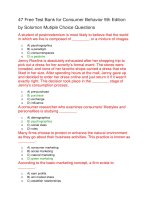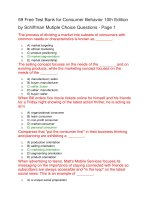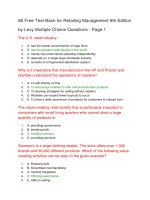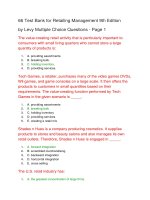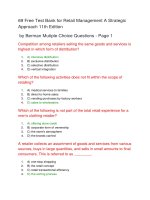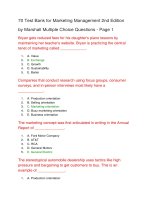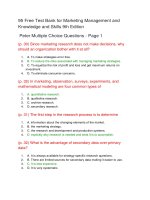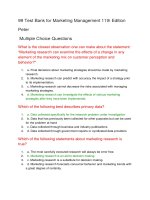66 free test bank for retailing management 9th edition
Bạn đang xem bản rút gọn của tài liệu. Xem và tải ngay bản đầy đủ của tài liệu tại đây (93.19 KB, 17 trang )
66 Free Test Bank for Retailing Management 9th Edition
by Levy Multiple Choice Questions - Page 1
The U.S. retail industry:
1.
A. has the lowest concentration of large firms.
2.
B. has the greatest retail density in the world.
3.
C. mostly has small stores operating independently.
4.
D. depends on a single large wholesale industry.
5.
E. consists of a fragmented distribution system.
Why is it imperative that manufacturers like HP and Procter and
Gamble understand the operations of retailers?
1.
A. To sell directly on-line
2.
B. To encourage retailers to offer and promote their products
3.
C. To develop strategies for selling without retailers
4.
D. Retailers can expect fewer buyouts to occur
5.
E. To have a wide assortment of products for customers to choose from
The value-creating retail activity that is particularly important to
consumers with small living quarters who cannot store a large
quantity of products is:
1.
A. providing assortments.
2.
B. breaking bulk.
3.
C. holding inventory.
4.
D. providing services.
Samson's is a large clothing retailer. The store offers over 1,000
brands and 50,000 different products. Which of the following valuecreating activities can be seen in the given example?
1.
A. Breaking bulk
2.
B. Scrambled merchandising
3.
C. Vertical integration
4.
D. Offering assortments
5.
E. Add-on selling
Shades n Hues is a company producing cosmetics. It supplies
products to stores and beauty salons and also manages its own
retail outlets. Therefore, Shades n Hues is engaged in _____.
1.
A. forward integration
2.
B. scrambled merchandising
3.
C. backward integration
4.
D. horizontal integration
5.
E. cross-selling
A major value-providing activity performed by retailers is _____, so
that products will be available when consumers want them.
1.
A. breaking bulk
2.
B. holding inventory
3.
C. scrambled merchandising
4.
D. backward integration
5.
E. providing assortments
A(n) _____ is a set of firms that make and deliver a given set of
goods and services to the ultimate consumer.
1.
A. supply chain
2.
B. buying network
3.
C. economic network
4.
D. integrated wholesale network
5.
E. extended enterprise
Dailies is a large retail chain in New Jersey. Apart from selling to
customers, Dailies supplies bread and vegetables to a large
number of restaurants in and around New Jersey. Therefore,
Dailies is engaged in _____ when selling to restaurants.
1.
A. wholesaling
2.
B. retailing
3.
C. merchandising
4.
D. breaking bulk
5.
E. channel expansion
Jenson's is a large retail store in Chicago. It offers credit so that
consumers can buy a product and pay for it later. Which of the
following value-creating activities is Jenson's undertaking in the
given example?
1.
A. Exclusive dealing
2.
B. Breaking bulk
3.
C. Holding inventory
4.
D. Offering assortments
5.
E. Providing services
A _____ is a business that sells products and/or services to
consumers for their personal or family use.
1.
A. manufacturer
2.
B. wholesaler
3.
C. retailer
4.
D. distributor
5.
E. none of these
_____ arises when a retailer performs some distribution and
manufacturing activities, such as operating warehouses or
designing private-label merchandise.
1.
A. Exclusive dealing
2.
B. Merchandising
3.
C. Backward integration
4.
D. Horizontal integration
5.
E. Forward integration
Which of the following businesses would NOT be considered a
retailer?
1.
A. A hot dog cart at the Highland Games
2.
B. Delta Airlines
3.
C. University bookstore
4.
D. Priceline.com
5.
E. Procter and Gamble
A retailer that is vertically integrated:
1.
A. concentrates on selling only to businesses.
2.
B. outsources all supply chain activities to independent firms.
3.
C. has limited control on the activities of the supply chain.
4.
D. performs more than one activity in the distribution channel.
5.
E. concentrates only on operating its own retail stores.
_____ occurs when a manufacturer undertakes retailing and
wholesaling activities.
1.
A. Merchandising
2.
B. Exclusive dealing
3.
C. Backward integration
4.
D. Horizontal integration
5.
E. Forward integration
Which of the following statements about retailers holding inventory
is FALSE?
1.
A. This activity benefits customers with limited storage space, such as families
living in small apartments.
2.
B. It allows manufacturers to efficiently make and ship merchandise in larger
quantities.
3.
4.
5.
C. Holding inventory in a store helps serve customers' needs.
D. Retailers keep inventory so products are available when consumers want
them.
E. Holding inventory reduces consumer's cost of storing products.
Which of the following value-creating activities has retailers offering
products in quantities tailored to customers' consumption patterns?
1.
A. Providing assortments
2.
B. Breaking bulk
3.
C. Add-on selling
4.
D. Holding inventory
5.
E. Scrambled merchandising
_____ means that a firm performs more than one set of activities in
the channel, as occurs when a retailer engages in wholesaling
activities by operating its own distribution centers to supply its
stores.
1.
A. Channel diversification
2.
B. Horizontal development
3.
C. Horizontal integration
4.
D. Vertical expansion
5.
E. Vertical integration
Which of the following is NOT TRUE of distribution systems of the
major international markets?
1.
A. The U.S. distribution system has the greatest retail density and the greatest
concentration of large retail firms.
2.
B. The Indian distribution systems are characterized by small stores operated
by small firms and a large independent wholesale industry.
3.
C. In the Chinese distribution system, the merchandise often passes through
several levels of distribution to make the daily deliveries to the small retailers
efficient.
4.
D. Northern European retailing is similar to efficient distribution systems in the
U.S.
5.
E. Indian and European economic policies are aimed at merging small
independent neighborhood retailers with large retail chains.
_____ is the value-creating activity in which a retailer makes
available a wide range of products of different brands and prices at
a single location.
1.
A. Providing services
2.
B. Breaking bulk
3.
C. Providing assortments
4.
D. Holding inventory
5.
E. Exclusive dealing
The U.S. retail industry has:
1.
A. the greatest concentration of large firms.
2.
B. the lowest retail density in the world.
3.
C. mostly small stores which operate independently.
4.
D. a single large wholesale industry supplying to all retailers.
5.
E. a fragmented distribution system.
Florals is a popular retail chain specializing in women's lingerie and
perfume. It designs the merchandise being sold in the store.
Therefore, Florals is practicing _____.
1.
A. channel expansion
2.
B. scrambled merchandising
3.
C. backward integration
4.
D. horizontal integration
5.
E. product diversification
Retailers function as wholesalers when:
1.
A. they hold inventory.
2.
B. they perform manufacturing activities.
3.
C. they practice scrambled merchandising.
4.
D. they sell to other businesses.
5.
E. there is an intratype competition.
Which of the following statements about the U.S. distribution
system is TRUE?
1.
A. The U.S. retail industry is mostly composed of many small and mediumsized firms.
2.
B. Many U.S. retailers are large enough to have their own warehouses.
3.
C. The retail density in the U.S. is lower than that found in Europe.
4.
D. A large independent wholesale industry supplies goods to all retailers.
5.
E. The U.S. retail industry has a fragmented distribution system.
The Chinese distribution system:
1.
A. has a combination of large stores and large firms resulting in an efficient
distribution system.
2.
B. is characterized by many small and medium-sized firms.
3.
C. has the most number of large retailers operating their own warehouses.
4.
D. is characterized by a high retail density.
_____ describes the voluntary actions taken by a company to
address the ethical, social, and environmental impacts of its
business operations and the concerns of its stakeholders.
1.
A. Forward integration
2.
B. Corporate social responsibility
3.
C. Integrity management
4.
D. Customer engagement
5.
E. Ethical behavior
A retailer's role in a supply chain is to:
1.
A. act as the liaison between manufacturers and suppliers.
2.
B. buy merchandise exclusively from the manufacturers.
3.
C. negotiate with manufacturers to draw contracts for wholesalers.
4.
D. add value to products and services sold to customers.
5.
E. sell goods and services to wholesalers.
Ruth's Fashions is a popular boutique in Atlanta. It has a Web site
that answers customer queries and also provides information on
new arrivals and discounts. Customers also receive product
information on their mobile phones. From the given example, it can
be seen that Ruth's Fashions is involved in _____, which is a valuecreating activity.
1.
A. breaking bulk
2.
B. holding inventory
3.
C. providing assortments
4.
D. exclusive distribution
5.
E. providing services
Retailers provide important functions that increase the value of the
products and services they sell to consumers. Which of the
following is NOT a value-creating activity performed by a retailer?
1.
A. Providing an assortment of products
2.
B. Reducing production costs with innovative designs
3.
C. Breaking bulk
4.
D. Holding inventory
5.
E. Providing an assortment of services
Fresh n Fragrant is a chain of flower shops offering a variety of
flowers and ornamental plants. It recently opened a distribution
center to supply ornamental plants and cut flowers to all its stores
within a 300-mile radius. From the given scenario, it can be seen
that Fresh n Fragrant is practicing _____.
1.
A. vertical integration
2.
B. channel expansion
3.
C. horizontal expansion
4.
D. horizontal integration
5.
E. channel diversification
Tech Games, a retailer, purchases many of the video games DVDs,
Wii games, and game consoles on a large scale. It then offers the
products to customers in small quantities based on their
requirements. The value-creating function performed by Tech
Games in the given scenario is _____.
1.
A. providing assortments
2.
B. breaking bulk
3.
C. holding inventory
4.
D. providing services
5.
E. creating a retail mix
Essentials, a retail store, manages its own warehouse. It also owns
a manufacturing facility where it produces private-label food
products. Therefore, Essentials is practicing _____.
1.
A. scrambled merchandising
2.
B. backward integration
3.
C. cross-selling
4.
D. horizontal integration
5.
E. forward integration
66 Free Test Bank for Retailing Management 9th Edition
by Levy Multiple Choice Questions - Page 2
Scrambled merchandising increases:
1.
A. vertical integration.
2.
B. intertype competition.
3.
C. concentric diversification.
4.
D. horizontal integration.
5.
E. intratype competition.
Which of the following is true of the career opportunities offered by
the retailing industry?
1.
A. Retailers employ people with exclusive expertise in supply chain
management.
2.
B. Retail managers are often given considerable responsibility early in their
careers.
3.
C. Retailing offers limited opportunities for entrepreneurs.
4.
D. Retail management is not a very lucrative career path.
5.
E. People with a marketing background have limited opportunities in the retail
industry.
Which of the following is a critical asset that enables retailers to
build strategic advantages?
1.
A. Holding inventory
2.
B. Breaking bulk
3.
C. Providing services
4.
D. Scrambled merchandising
5.
E. Supply chain organization
Which of the following is the first step in the retail management
decision process?
1.
A. Developing the retail communication mix
2.
B. Buying merchandise
3.
C. Developing a retail marketing strategy
4.
D. Understanding the world of retailing
5.
E. Customer relationship management
A company in the first stage of incorporating corporate social
responsibility (CSR) into its strategies:
1.
A. only engages in CSR activities that are required of it by law.
2.
B. engages in CSR activities that provide a short-term financial benefit.
3.
C. engages in CSR activities because they believe it is the right thing to do.
4.
D. engages in CSR activities for the well-being of everyone.
Which of the following is true of retailing activities in the BoP
market?
1.
A. Retrofitting business models used in the more developed markets has
proven successful.
2.
B. Most people in BoP markets live in rural areas with limited access to mass
media.
3.
C. The ideas used in BoP retail marketing are similar to conventional retailing
strategies.
4.
D. High local demand results in low prices for consumer goods.
Daily Needs and Smart Saves are two large retailers in Canada.
They compete with each other using similar marketing strategies.
Which form of competition is seen between these two retailers?
1.
A. Intertype competition
2.
B. Indirect competition
3.
C. Intratype competition
4.
D. Scrambled merchandising
5.
E. Intrinsic competition
Which of the following is NOT an element in the retail mix?
1.
A. Competitive response
2.
B. Merchandise pricing
3.
C. Location
4.
D. Customer service
5.
E. Advertising and promotion
When Austin saw pastries and coffee being sold at his local
bookstore, he knew it was an example of _____.
1.
A. scrambled merchandising
2.
B. intertype competition
3.
C. product diversification
4.
D. channel conflict
5.
E. vertical differentiation
A retailer's primary competitors are other retailers that:
1.
A. are more vertically integrated.
2.
B. use the same type of store format.
3.
C. have the same target market.
4.
D. sell online.
The intensity of competition is greatest among retailers when:
1.
A. price dominates the retail mix.
2.
B. their retail offerings are considered to be similar.
3.
C. they resort to scrambled merchandising.
4.
D. they focus on a narrow demographic trend.
5.
E. they offer a limited range of products and services.
The competition between the same type of retailers is called
_____.
1.
A. intertype competition
2.
B. indirect competition
3.
C. intratype competition
4.
D. scrambled merchandising
5.
E. intrinsic competition
A _____ refers to the market toward which a retailer will direct its
efforts.
1.
A. channel member
2.
B. market segment
3.
C. target market
4.
D. mass market
5.
E. warm market
Bright Automotive Inc. does not have employees below the age of
16 since the law prohibits it. Therefore, Bright Automotive is in the
_____ stage of incorporating corporate social responsibility.
1.
A. initial
2.
B. second
3.
C. tertiary
4.
D. fourth
5.
E. acquisition
Which of the following is NOT an example of intertype competition?
1.
A. A supermarket and a fresh flower stand
2.
B. A coffee shop and a fast food restaurant
3.
C. A supercenter and a pharmacy
4.
D. An American Eagle store and a Macy's store
5.
E. A Target store and a Walmart store
A company in the final stage of integrating corporate social
responsibility into its strategies:
1.
A. only engages in CSR activities that are required of them by law.
2.
B. engages in CSR activities that provide a short-term financial benefit.
3.
C. engages in CSR activities because they believe it is the right thing to do.
4.
D. engages in responsible activities for the well-being of everyone.
Retail information and supply chain management systems help
retailers to:
1.
A. gain strategic advantages.
2.
B. monitor the flow of information and merchandise.
3.
C. make sure desired merchandise is available when customers want it.
4.
D. minimize the retailer's inventory investment.
5.
E. all of these.
_____ are the principles governing the behavior of individuals and
companies that establish appropriate behavior and indicate what is
right and wrong.
1.
A. Ethics
2.
B. Acts
3.
C. Training guidelines
4.
D. Company traditions
5.
E. Legislations
A _____ identifies the target market, the merchandise and services
that will be offered, and how the company will achieve long-term
advantage over its competitors.
1.
A. retail strategy
2.
B. corporate strategy
3.
C. retail mix
4.
D. supply chain
5.
E. product mix
Karen's is a popular clothing store in Boston. The store recently
started selling designer watches. Thus, Karen's is practicing
_____.
1.
A. channel expansion
2.
B. intertype competition
3.
C. product diversification
4.
D. scrambled merchandising
5.
E. vertical differentiation
When developing the _____ for his salon, Theo decided to obtain a
long-term competitive advantage over other salons by offering
longer hours, better prices, a well-trained staff, and a perm for halfprice every Wednesday to attract customers.
1.
A. selling concept
2.
B. business cycle
3.
C. retail strategy
4.
D. focal point orientation
5.
E. marketing concept
As the owner of Knights, a store specializing in men's suits, Isabella
can use a retail strategy statement to identify all of the following
EXCEPT:
1.
A. the advertising campaign developed to sell last season's merchandise.
2.
B. the store's target market.
3.
C. how the store will build a competitive advantage over other similar retailers.
4.
D. what services the store will offer its customers.
5.
E. what types of suits the store will stock.
Increasing intertype competition has made it harder for retailers to
identify their:
1.
A. competition.
2.
B. target market.
3.
C. merchandise mix.
4.
D. retail mix.
5.
E. price points.
Which of the following is a key strategic decision made by a
retailer?
1.
A. Managing merchandise inventories
2.
B. Defining the target market
3.
C. Managing the store
4.
D. Creating the retail communication mix
5.
E. Implementing visual merchandising
The retailer strategy helps a retailer to identify all of the following
EXCEPT:
1.
2.
A. the target market toward which the retailer will direct its efforts.
B. the nature of the merchandise and services the retailer will offer to satisfy
the needs of the target market.
3.
C. how the retailer will build a long-term advantage over its competitors.
4.
D. how to determine the break-even point for making profits.
Prime Industries Inc. is a large company producing a wide range of
chemicals. The company recently installed a waste water treatment
facility in its premises. It believes that releasing water containing
chemical waste into the river would harm the entire population of
the city. Thus, it is in the _____ stage of incorporating corporate
social responsibility.
1.
A. initial
2.
B. second
3.
C. tertiary
4.
D. final
5.
E. acquisition
_____ form a part of the microenvironment that influences retail
management decisions.
1.
A. Competitors
2.
B. Technologies
3.
C. Politics
4.
D. Legal aspects
5.
E. Ethics
A retail mix refers to:
1.
A. a strategy for identifying primary competitors through market research.
2.
B. the idea of selling similar merchandise using different types of retail outlets,
such as drug and department stores.
3.
C. the concept of offering merchandise not typically associated with their type
of store.
4.
D. a set of decisions retailers make to satisfy customer needs and influence
their purchase decisions.
5.
E. a retailer's decision to undertake wholesaling and manufacturing activities.
A retail mix is developed to:
1.
A. promote scrambled merchandising.
2.
B. implement a retail strategy.
3.
C. understand the retail market.
4.
D. implement vertical integration.
5.
E. formulate a retail strategy.
_____ are the most concentrated sector of the retail industry in the
U.S.
1.
A. Fitness centers
2.
B. Drugstore chains
3.
C. Apparel stores
4.
D. Home improvement centers
5.
E. Food and beverage services
The offering of merchandise not typically associated with the store
type is called:
1.
A. scrambled merchandising.
2.
B. intratype competition.
3.
C. product diversification.
4.
D. channel diversification.
5.
E. vertical differentiation.
Retailers use customer transaction data to:
1.
A. identify their best customers.
2.
B. match the needs of a store's local market.
3.
C. create customized promotions.
4.
D. tailor product assortments.
5.
E. all of these.
Students often view retailing as part of marketing because:
1.
A. retailing does not involve traditional business activities.
2.
B. retailing involves the management of distribution systems.
3.
C. retailing requires only people with expertise in marketing.
4.
D. activities in retailing are confined to advertising and promotion.
Darius Foods Inc. and Winston Foods and Beverages Inc. are
competitors selling frozen meals. Darius sells its products through a
large number of local convenience stores, while Winston sells its
frozen meals through delis. Which form of competition is seen
between these two firms?
1.
A. Intertype competition
2.
B. Indirect competition
3.
C. Intratype competition
4.
D. Scrambled merchandising
5.
E. Intrinsic competition
Which of the following statements is true of ethical principles?
1.
A. Ethical principles can change over time.
2.
B. Ethics remain the same irrespective of the country or industry.
3.
C. Most people have common views on ethical and unethical practices.
4.
D. The personal code of ethics does not play a role in business decisions.
5.
E. Ethical principles are often easy to determine.
